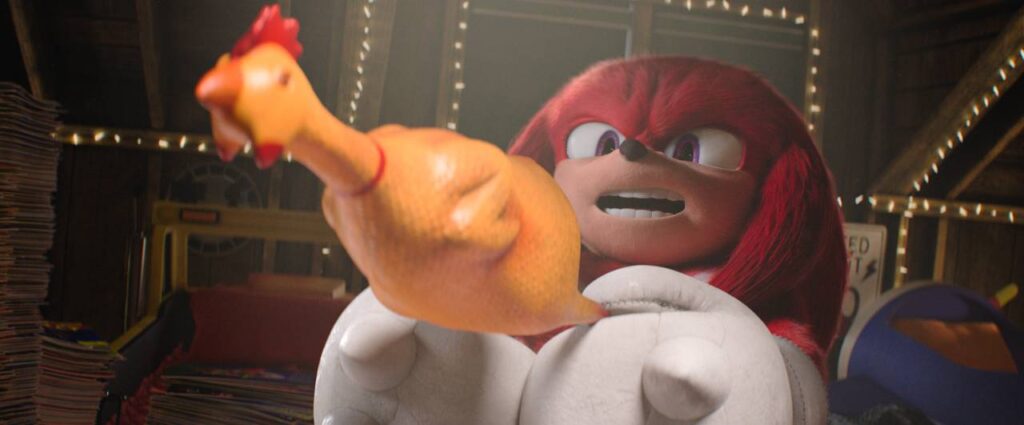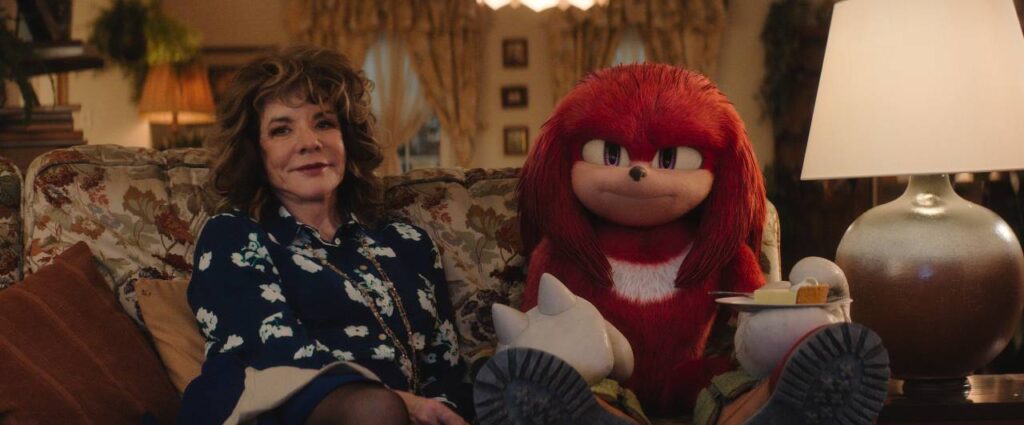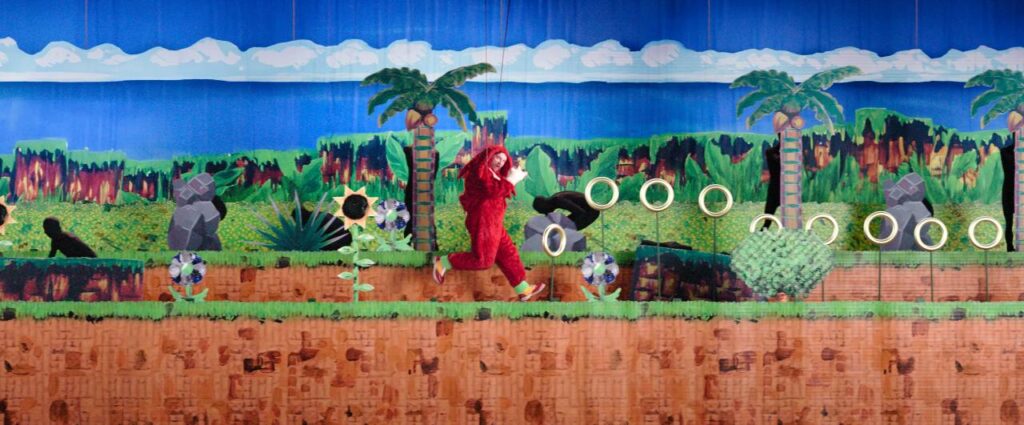Read also:
How to Watch FX Live Without CableHow To Watch AMC Without CableHow to Watch ABC Without CableHow to Watch Paramount Network Without CableSo. Knuckles the Echidna attends a Shabbat dinner. That isn’t the start of a joke for an incredibly specific audience; that’s the set-up for episode three of his new miniseries. Picking up where Sonic the Hedgehog 2 left him, the six-episode show follows the last of the Echidna Warriors on his epic, life-defining quest to define his life with something other than epic quests and grand battles. Knuckles trying to live his life as though his mission to protect the all-powerful Master Emerald was the alpha and omega of his existence only resulted in driving his foster mother, Maddie Wachowski (guest star Tika Sumpter), up the wall and getting himself grounded. So, after some prodding by Sonic (guest star Ben Schwartz) and the ghost of Echidna Chief Pachacamac (Christopher Lloyd), Knuckles gets down to figuring out who he wants to be and what he wants to do with his life.
His new purpose? Help Green Hills’ goofball deputy sheriff Wade Whipple (Adam Pally) find his dignity by teaching him the ways of the Echidna Warrior so that he might apply those ways at a national bowling championship and, through struggle and glorious victory, put some ghosts from his past to rest. Their allies? Wade’s loving, world-weary mom, Wendy (Stockard Channing), and his trying-way-too-hard FBI agent sister, Wanda (Edi Patterson). Their foes? A duo of rogue GUN agents (Scott “Kid Cudi” Mescudi and Ellie Taylor) who want to sell Knuckles to a Dr. Robotnik wannabe (Rory McCann), Wade’s egomaniacal bounty hunter ex-best-friend Jack Sinclair (Julian Barratt), and a champion bowler who moonlights as an utterly despicable cretin (Cary Elwes).

From the jump, Knuckles is deliberately and intensely silly. Knuckles’ initial stubborn devotion to his life-is-the-capital-letters-MISSION-and-nothing-else mindset becomes a vehicle for action comedy beats built on the dissonance between the inherently ridiculous image of grown men being manhandled by an anthropomorphic echidna and the fact that ridiculous or not, Knuckles is absurdly strong and, when he wants to be, creative on the battlefield. When Sonic and Tails (guest star Colleen O’Shaughnessey) convince him to try making himself at home, Knuckles certainly does. After all, what’s more homey than a giant throne in the dining room and swapping the den for an Echidna fighting pit?
Deciding to take on Wade as a protege grounds Knuckles. Training Wade to apply the way of the Echidna Warrior to life and bowling lets Knuckles carry his way of life into his new status quo rather than his initial, disastrous attempts to live as though nothing about his life had changed dramatically. It shifts the Echidna from fish-out-of-water to older brother/sensei. He’s still comically stern and straight-laced, but finding purpose makes him more flexible and open to life on Earth. While Knuckles doesn’t have the same range or depth that, say, Phantom Liberty‘s Solomon Reed does, Elba is game throughout for both the silly and the dramatic.

Indeed, one of Knuckles‘ strengths as a series is its complete comfort with itself. It’s a Sonic the Hedgehog project. That means colorful, cartoony, anthropomorphic animal protagonists interacting with everyday humans. It’s bizarre, and trying to deny or downplay that would be a one-way ticket to the dreaded isle of “Well, that happened” level quippery. Instead, Knuckles (and, by extension, the earlier Sonic movies) roll (around at the speed of sound) with it. Once the initial shock of meeting Knuckles wears off, folks adjust. Yes, it’s ridiculous, and it’s the world. By accepting this, Knuckles 1: gives itself plenty of opportunities to embrace that ridiculousness and 2: creates space for drama (the Whipple family’s baggage and Taylor’s Agent Wiloughby despising Knuckles for not being the monstrous xenomorph she needs aliens to be, for instance) and here and there, genuine loveliness (Knuckles and the Whipples, for all their tension, coming together to watch the Shabbat candles burn out).
Running with the world being wild also gives Knuckles the space to be wild. This is a buddy road trip miniseries about a hapless sheriff’s deputy and a superstrong Echidna from another world dodging bounty hunters on the way to a bowling tournament. So why not interrupt a brawl for one of the fighters to take a call from his mom? Why not devote an episode to a miniature rock opera that features elaborate puppetry, stagehands in all black, and a visual homage to Sonic‘s bonus levels? Why not have Wade affirm his self-worth by engaging in a motorcycle vs. child’s bicycle katana duel? It’s delightful work, and over the course of Knuckles‘ six episodes, I cackled repeatedly.

With that said, Knuckles‘ constant wackiness, especially when tied to Wade’s cluelessness, is a specific taste that could easily grate for audiences (kids, parents, Sonic fans, and company) who prefer a lower key. Pally’s a likable lead, and as Wade puts himself together, his more obnoxious moments of foolishness give way to a confidence that, while not devoid of his earlier doofiness, marks growth and maturation that Pally sells. His success as a lead matters, especially during the portions of the series where he takes over as the primary lead—which brings me to Knuckles‘ other major issue. While it’s not as pronounced as The Book of Boba Fett stepping away from Boba Fett for a full episode, watching Knuckles back-to-back reveals that the creative team had to be careful about where and how they used their all-CGI lead played by an A-list actor. Had Pally not been able to step up, Knuckles could easily have sunk. Fortunately, he does indeed step up.
Knuckles is a delight. It’s a solid family show built on likable leads (outside of Elba and Pally, Mescudi and Elwes are the standouts—the latter can do loathsome as marvelously as he does dashing), a willingness to get playful and well-crafted action. And it had me in stitches repeatedly. It’s well, well worth checking out.
Knuckles glides onto Paramount Plus on Friday, April 26th.